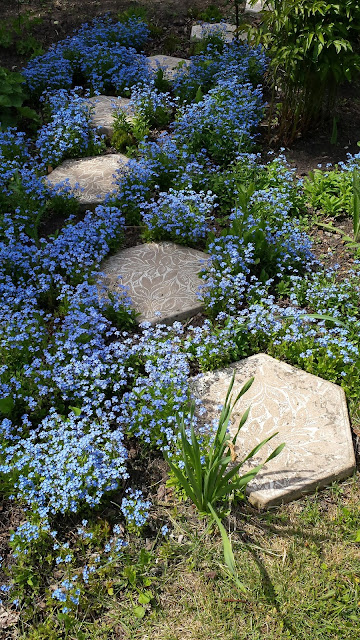Oh look; a rainbow!
 |
| Once upon a garden path |
II Corinthians 6:16-18, NIV (Paul writing to the Corinthian Church.)
"What agreement is there between the temple of God and idols? For we are the temple of the living God. As God has said:'I will live with them and walk among them, and I will be their God, and they will be my people.' [Leviticus 12: 26]
Therefore, 'Come out from them and be separate, says the Lord. Touch no unclean thing, and I will receive you,' [Isaiah 52:11]
And, 'I will be a Father to you, and you will be my sons and daughters, says the Lord Almighty.'" [II Samuel 7:14]
Sometimes we're faced with the struggle
of reconciling apparently opposed "truths." Like finding a
way both to keep our children close and safe while releasing them so
they learn to survive and thrive without us. The Christian life
includes any number of such paradoxesi
as, for instance, in "love your enemies," or "whoever
seeks to save his life shall lose it."
A particularly thorny paradox for my
Anabaptist faith community for centuries now has been the paradox of
separation/engagement. While Jesus "ate with sinners" and
urged us to go out into the world to "preach the gospel to
every creature," Paul channels the Old Testament in a plea to
early Christians to separate themselves from the pagan world around
them. In Old Colony and Hutterian Brethren branches of Anabaptist
faith, for instance, separation taken very literally has become a core principle.
In more liberal branches engagement holds equal sway or predominates,
manifested in material aid: health and education provision; peace,
justice and development efforts.
It seems too simple to say that
solving the paradox is easy: separation in faith and ethic,
engagement in mission and outreach. Problem solved.
Not really. What we've learned from
experience is that when we "engage," it's almost inevitably with
people who live under a similar separation/engagement paradox. Take
immigration to Canada of Muslim families. For them the
separation/engagement paradox is a source of stress and anxiety and
something as simple as applying Christian neighbourliness to them is
never a one-off-and-done project. It's persistent, patient
relationship-building without a mandatory end-result in mind that's
needed. This can't happen unless we've come to terms with our own
separation/engagement anxieties and confusions, and a separation complex,
isolationism can't achieve this; the dream of a world of peace and justice will
come to mean very little to us if withdrawing from the public becomes
our defining ethic.
There's something practical and
necessary about urging a new Christian (say a recovering alcoholic)
to steer clear of old haunts and habits, to "separate." The
break may be instant (a born again experience?) but as has been shown
repeatedly, it's engagement over the long haul that makes the
difference. I think it was a similar exception that Paul was talking about to
newly-converted Corinthian Christians.
It also seems practical and necessary
in raising our children that we prevent their absorption into haunts
and habits leading toward destructive ends, but "stay away from
the Herdmans" is not precaution enough; I think Jesus would have
us engage with the Herdmans, build a relationship that could help
them onto a new path . . . if that's what's needed.
A "wise" Christian has
probably sensed and acknowledged the tension between separation and
engagement, and has through study, dialogue and contemplation learned
how to "divide that 'truth' rightly" (II
Timothy 2:15). Unfortunately, we've too often opted for dividing
the church wrongly instead . . . the easy way out. That choice
has really proved itself to result from a separation complex left unresolved. Us and them.
I am thankful today for all those
Christians who are "out there," who are risking their
safety, their comfort, their reputations to foster peace and good
will in their families, in their church, in their communities, in
their nation, in the world generally. They're not preoccupied with
winning numbers of people to their brand of separation, they're
following the call to flavour (think salt) and light up (think
modeling justice, mercy, kindness) the world as they find it,
employing the talents with which they've been gifted.
Then said Jesus unto him, 'Go, and do thou likewise.'" (Luke 10: 36-7, KJV)
A refreshing thing about a good paradox is that, if nothing else, it can remind us that black and white aren't the only colours! "Oh look," she said, "a rainbow!"
i
Paradox: a
statement or proposition that seems self-contradictory or absurd but
in reality expresses a possible truth.



I love 🌈 rainbows! Thanks for the reminder George that the world is more than black and white!
ReplyDeleteThanks, Ruth
ReplyDelete